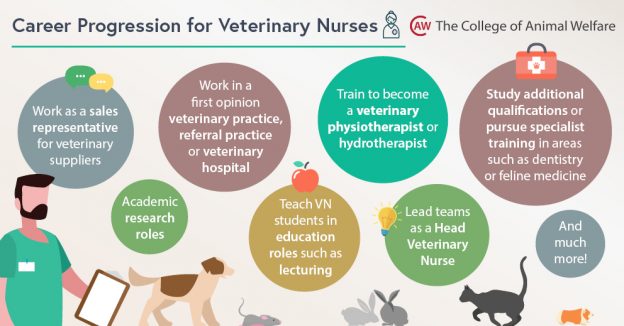Where can an RVN qualification take you?
Veterinary nursing is a varied and rewarding career path which opens up a wide variety of professional opportunities. Whether you’ve just qualified as a veterinary nurse, have been working in the industry for some time and looking for a career change, or considering training as a veterinary nurse in the future – read on to find out more about veterinary nursing career opportunities…
General practice
Jobs in veterinary practice on completion of formal training are excellent. Many veterinary nurses choose to remain in first opinion veterinary practice, however there are also options to move into referral practice or into a large veterinary hospital and specialise in a particular area, such as surgical nursing. You could also become a locum veterinary nurse.
Nurses must continue to study and log professional development hours to maintain their registration throughout their careers. This means there is plenty of opportunity to pursue professional interests, study additional qualifications such as the Level 5 Advanced Diploma in Veterinary Nursing (Practice Nurse), or undertake specialist training in a range of topics, particularly the care of exotic pets, feline medicine, anaesthesia and dentistry.
Education
Many RVNs use their qualifications to pass on skills and expertise to the next generation of nurses in education roles. Teaching positions can vary widely, but veterinary nurses who choose to take up a role in education might be writing and developing course content, presenting lectures, workshops and practical teaching sessions, providing student support and guidance, assessing and moderating students, or undertaking research and representing educational institutions at conferences and exhibitions. Find out more about becoming a Veterinary Nursing Lecturer
Leadership and Management
If you’re looking for leadership and management opportunities within veterinary practice, you could become a head nurse.
Head Veterinary Nurses lead and provide support to veterinary nursing and veterinary care teams in practice. Day-to-day, this may cover many areas in team management, for example recruitment, selection, development, absence reporting and monitoring in line with practice policies. The role is perfect if you’re looking for a bigger influence over practice life by developing staff and clinical practice. You could undertake formal leadership and management training, and even work towards becoming a veterinary practice manager over time. The Veterinary Management Group (VMG) can provide more information about management opportunities and training.
Sales
Another career route you may take once you have qualified as a veterinary nurse is working for one of the many companies and service providers that supply the veterinary industry as a sales representative.
Becoming a veterinary sales representative is one of the less-recognised career paths open to veterinary nurses. It offers a fantastic opportunity to travel, meet new people and help veterinary surgeons, veterinary nurses and other professionals to deliver better care to their patients.
As a veterinary sales representative you would be promoting new products directly to people involved in animal health. You would keep your clients up-to-date with fresh developments and recent scientific advances. You may also offer in-house, product-related training for clients.
Rehabilitation
As a qualified veterinary nurse, you could grow your career by training to become a veterinary physiotherapist or hydrotherapist. Rehabilitation following veterinary referral can help animals recover following surgery and from a variety of conditions such as pack pain, sprains, strains, fractures and sporting injuries. It has become a growing service within specialist veterinary hospitals, referral centres and first opinion practices. You can visit our career profiles to find out more about how to pursue a career in veterinary rehabilitation.
Writing and research
If you have studied to become a veterinary nurse at degree level, you may wish to pursue a career in conducting and publishing research. This work is essential to developing veterinary nursing techniques and championing evidence-based practice.
You could also take your academic development in a new direction by speaking at industry congresses and events. If you have a creative flair, you could also aim to become a freelance writer. You could even start your own blog!
Want to train as a veterinary nurse?
Career opportunities for qualified veterinary nurses are varied and wide-ranging. If you’re looking to kick-start a career as a veterinary nurse, we deliver veterinary nurse training from centres all over the UK, with intakes starting throughout the year.
Apply to start training as a veterinary nurse
Veterinary Nursing Awareness Month (VNAM) was originally started by BVNA in 2005 as National VN Day and has since progressed into National VN Week, followed by a whole month campaign since 2012 to spread the word about the importance of the role of the veterinary nurse in practice and the provision of responsible pet care to the general public. To find out more visit the BVNA website.

